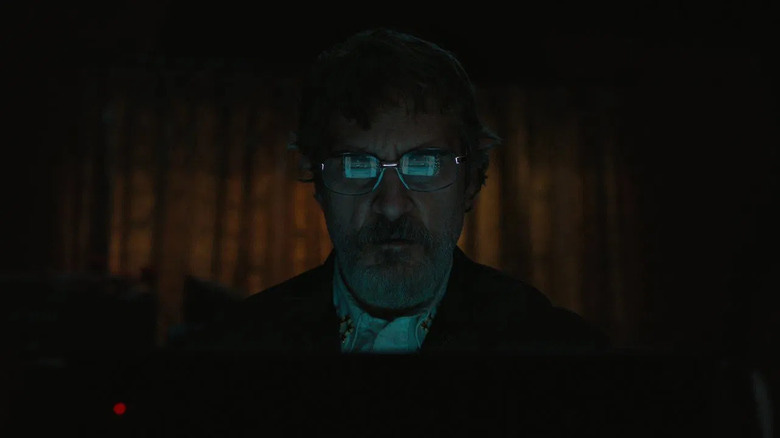Performing for the Machine: Eddington, Middlemarch, and Political Theater
George Eliot's performative politics of 1871 finds its nadir in Ari Aster's masterpiece of algorithmic capitalism.
What cracked in 2020?
Was it the culmination of long-standing injustices finally rupturing the surface? Or did we all just go collectively insane from being trapped inside with our screens? The answer hardly matters when fear and frustration twist the mind the same way, giving license to our worst and most animalistic impulses.
Ari Aster's Eddington takes us back to May 2020 and shows a very human path toward anger and violence—one that perhaps we're still on. Like Robert Altman's Nashville and the Coen Brothers' No Country for Old Men, it presents American division and violence as both cyclical and inevitable.
Aster won't let us escape the brutal truths of those times. While we performed our politics for each other, tearing our communities apart over masks and protests, the dehumanizing march of big tech carried onward.
In Eddington, every character—progressive or conservative, conspiracy theorist or centrist—is performing. And their performances serve powers that profit from division.
These aren't new lessons. They work particularly well in Eddington’s Western setting, where small-town values often mask darker impulses, or heroes are forced to stand alone and principled.
But ruminating on the film, I kept coming back to a different provincial setting: George Eliot's Middlemarch, which I'd recently finished reading. While Eliot's novel differs considerably in tone, it shares DNA with Eddington.
Published in 1871-72, Middlemarch is often called the greatest English novel—a panoramic study of provincial life set forty years earlier during the Reform Act of 1832. Eliot dissects an entire community with scientific precision, showing how personal ambitions and social pressures corrupt even the most idealistic intentions. It's a novel about how good people fail, how reformers become hypocrites, and how the machinery of society grinds down individual nobility.
George Eliot takes as dim a view of political activism in Middlemarch as Aster does in Eddington.
Performative Politics and "Reform"
In his recent analysis of the novel, author Henry Oliver says Middlemarch is "a novel about sympathizing with everyone." For Eliot, that sympathy extends to how we all perform political positions when it suits our personal interests or glory.
Take Mr. Brooke, who runs for Parliament on Reform despite neglecting his tenants for decades. His campaign speech ends with suffering workers pelting him with eggs while he fumbles progressive talking points he can't remember. As Eliot writes: "He had never been insulted on his own land before."
He can't see his neglect as insult, only their response.
Or Tertius Lydgate, an ambitious doctor whose medical reforms get compromised the moment he needs funding. He votes against conscience for hospital money, moderates his methods for social acceptance. He marries the vapid Rosamond Vincy, whose expensive tastes drain both finances and idealism. As Eliot writes, his revolutionary plans become "dispersed among all the little local concerns." His idealism is literally swallowed by Middlemarch. Whatever core he begins with is whittled away by the rabbit hole he blithely climbs into.
Eddington's characters are their algorithmic descendants.
The film centers on Sheriff Joe Cross (Joaquin Phoenix) running for mayor against incumbent Ted Garcia (Pedro Pascal), who Cross believes once slept with his wife Louise (Emma Stone). As Aster explained on the Mixed Signals podcast, he wanted to capture how "every character in this film is somebody who really cares about the world and knows deep down in their bones that something is really wrong. They just all are living in different realities and they disagree on what that thing is."
Pascal, in a New York Times profile of Aster, found the script painfully accurate in capturing our culture's "anxiety, paranoia, despairing isolation and aimless individualism"—conditions that make genuine reform impossible.
As the Times noted about the film's characters, they have "various grievances, most of which are justified," but they "use bad information to make terrible choices."
The Dark Research Libraries of the Mind
The saddest parallel to our anti-social age is Edward Casaubon. Dorothea Brooke—Middlemarch's idealistic young heroine who hungers for meaningful work in a world that offers educated women few options—marries the much older scholar believing she'll assist in great intellectual labor. Instead, she discovers Casaubon has spent decades on his "Key to All Mythologies"—a doomed project connecting all world religions.
Casaubon thinks he's in dialogue with great minds but sits alone in his library, mistaking accumulation for understanding.
"In bitter manuscript remarks on other men's notions about the solar deities," Eliot writes, "he had become indifferent to the sunlight."
Casaubon is so busy fighting dead scholars about sun gods he can't see actual daylight. Today's Casaubons "do their own research"—our era's "Key to All Mythologies."
Aster frames them perfectly: faces lit by laptop screens in dark rooms, printouts left on bedroom pillows. Each alone but convinced they're part of a truth-seeking community. As Aster observed on Mixed Signals: "nobody knows what's going on. There's no contending with anything."
When Aster created fake social media profiles for research, he discovered: "the deeper I went on any given one and you know depending on what you're clicking on and what you're liking... the more kind of irretrievable you are." He spent time "slapping everything down on paper... scrolling a lot and taking screenshots" of what "this culture feels like, you know, which is horrible, just like just total garbage."
The theorists see themselves as heroes: "I need to bring light to something that has been buried." Both Casaubon and the conspiracy theorists use "research" as political pretext. "I've done my research" becomes the modern way to end conversation rather than start it.
The Data Center Always Wins
Aster's vision is ultimately darker than Eliot's. While the sheriff and mayor tear each other apart over masks and political theater, the data center being built outside town advances its agenda regardless of who's in charge. By the film's end, after the violence erupts, we see Cross's conspiracy theorist mother-in-law at its ribbon-cutting ceremony, blessing the very development she once manically opposed.
This is Aster's masterstroke: showing how our political performances, whether progressive or conspiratorial, serve the same masters. The data center doesn't care if you're posting Black squares or QAnon theories. It profits from both equally. As Aster insisted in the New York Times profile, "the movie is just really about a data center being built."
While the town tears itself apart, algorithmic capitalism quietly advances.
The third act violence—which at first seems to erupt from community tensions—may actually be fostered by those who benefit from a divided populace. The data center represents pure algorithmic control. We're performing our politics for machines that feed on our division.
The Personal Nature of Real Progress
Eliot's idealistic Dorothea achieves genuine transformation—but only through private struggle, away from political platforms. After marrying Casaubon with dreams of assisting great intellectual work, she discovers both his fraudulent scholarship and her own naive projections. Through this profound disappointment, watching her husband's jealous decline and eventual death, she alone "reformed herself," moving from rigid Puritanism to genuine sympathy.
Her transformation accelerates through her growing connection with Will Ladislaw—Casaubon's young cousin, an artist and political writer who represents everything her husband is not: vital, engaged with the world, capable of genuine feeling. Despite Casaubon's posthumous attempt to control her through his will (which disinherits her if she marries Will), Dorothea chooses love and active engagement over wealth and social position.
As she tells Will: "by desiring what is perfectly good, even when we don't quite know what it is and cannot do what we would, we are part of the divine power against evil—widening the skirts of light and making the struggle with darkness narrower."
Her real reforms happen quietly after her remarriage: properly built workers' cottages, financial support for the disgraced Lydgate when scandal threatens his practice. Individual acts, not movements.
Eddington offers no Dorothea—perhaps because machines don't allow for her sort of patient moral development.
Characters exist in separate frames, lit by different screens showing different realities. Where Altman's Nashville used overlapping dialogue to show people talking past each other, Aster uses overlapping feeds. They're not even having the same conversation.
When Aster visited actual New Mexicans for research—"going back out to New Mexico, driving around the state, going to different counties, talking to sheriffs, going to small towns and talking to mayors and police chiefs and public officials"—he found something revealing. According to the Times profile, many people he met "were full of passion and conviction and genuinely wanted to see the world improve" but "saw reality in ways that were totally contrary to how Aster understood it."
As Aster continued: "There's a tendency to just dehumanize people who don't agree with you." But we're "being pumped 24/7 full of messaging and a lot of people's hearts and minds are being poisoned."
Neither side achieved what Henry Oliver highlights as Dorothea's great discovery—recognizing that others have "an equivalent centre of self."
Unhistoric Acts
Middlemarch ends with quiet acts of humanistic grace. Eddington with the bright lights of a data center born from violence. Yet both reach similar conclusions about political posturing and how real good is done in the world.
Eliot insists "the growing good of the world is partly dependent on unhistoric acts." Dorothea's influence spreads quietly through individual kindnesses. Those who "lived faithfully a hidden life, and rest in unvisited tombs" matter most.
Eddington offers no such comfort. There are no unhistoric acts when every gesture feeds the algorithm. No hidden lives when everything is data. No patient accumulation of good when the machine demands instant performance.
The most terrifying thing about Eddington isn't the violence or the performances or even the absence of heroes. It's that it feels impossible a Dorothea could exist in this world. The film's closest analogue—Cross's wife Louise—is deeply broken by past traumas.
Middlemarch shows how petty jealousies, performative politics, and lack of self-awareness are core to the human experience. Their contradictions are particularly visible in a small town.
Eddington shows the same provincial narcissism—but now it's weaponized by algorithms. We're all performers now, feeding the machine that feeds on us. And unlike Dorothea's embrace of realistic divine grace, the algorithm offers no redemption.
Only more content. And maybe more violence.







